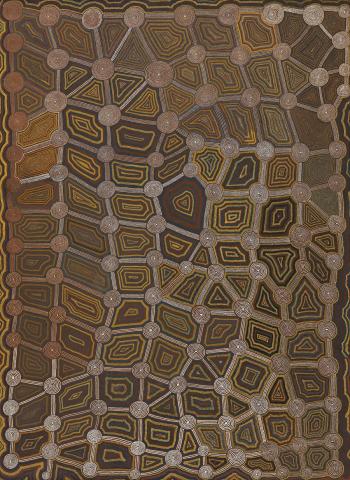TINGARI PAINTING, 1985
WILLY TJUNGURRAYI
synthetic polymer paint on linen
275.0 x 200.0 cm
inscribed verso: Papunya Tula Artists cat. WT850850
Papunya Tula Artists, Alice Springs
Corporate Collection, Melbourne
Sotheby's, Melbourne, 25 July 2005, lot 81
The Austcorp Group Limited Art Collection, Sydney
Sotheby's, Melbourne, 24 November 2009, lot 80
Private collection, Amsterdam
Tingari Story, 1986, synthetic polymer paint on linen, 240 x 360 cm, collection of the Art Gallery of New South Wales, Sydney, illus. in Perkins, H. and Fink, H. (eds.), Papunya Tula, Genesis and Genius, Art Gallery of New South Wales, Sydney, 2000, p. 96
Tingari Story, 1985 is a monumental painting by one of the original Papunya artists. With his elder brother Yala Yala Gibbs Tjungurrayi, Willy Tjungurrayi was one of the principle advocates of the Pintupi style as it evolved in the early 1980s. While Papunya Tula paintings had become increasingly distant in style from their ceremonial origins, one feature has remained a constant, the Tingari. Recording the ancestral journeys of the ancestral men and women who travelled across the land creating the geographical features and disseminating Pintupi law has been at the centre of Pintupi painting since the first days of the movement in 1971-72. Key elements such as linked concentric circles have come to be understood as classic iconography of the Pintupi's depiction of the Tingari. 'This sacred geometry contains simultaneous references relating to ceremonial body paint designs, the cartography of country and particular narratives of Tingari ancestors'.1
In-filled with dotted irregular shapes that have been pushed and pulled by the uneven grid of the roundels and finished in traditional colours of earthy browns, red, black and yellow with the linked concentric circles highlighted in white, Tingari Story, 1985 adheres to a stylistic conformity in the depiction of its subject matter, thus protecting its restricted meaning.
1. Perkins, H. and Fink, H. (eds.), Papunya Tula, Genesis and Genius, Art Gallery of New South Wales, Sydney, 2000, p. 180
CRISPIN GUTTERIDGE
